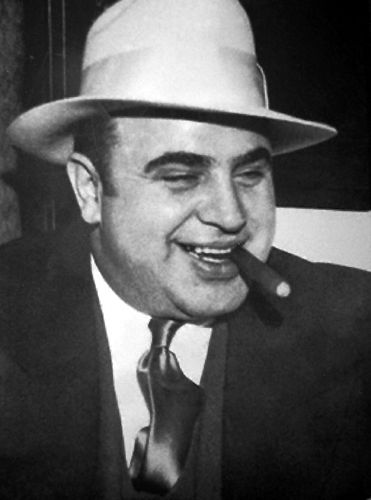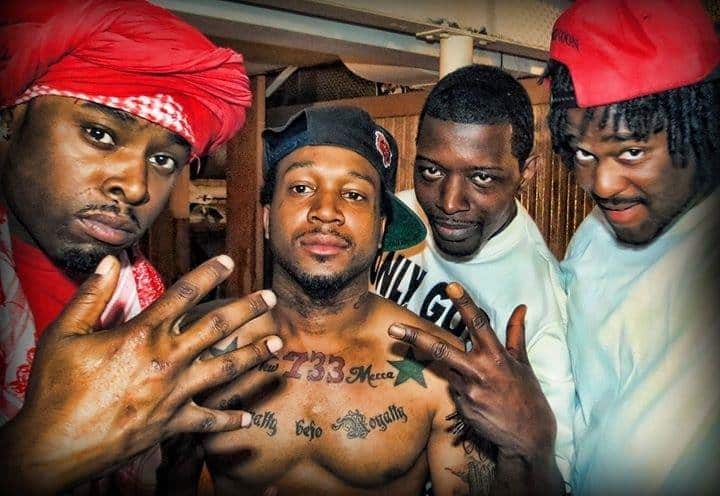Crime Is No Longer a Family Business in Chicago
By

Al Capone
Members of the Black P. Stones street gang
When I was a kid and told people not from Chicago, the city of my birth and upbringing, where I was from, it wasn’t uncommon for them to raise their arms as if holding a machine gun, murmur ratatatatatat, then utter “Al Capone.” Capone died in 1947, but Chicago and violence have ever after been linked. And now that link is more firmly established than ever, given the murder and shooting statistics announced at the end of every weekend in the city.
After Prohibition, crime in Chicago moved from bootlegging to gambling, prostitution, and loan-sharking. These operations were run by a group of mostly Italian and some Jewish gangsters known variously as the Syndicate, the Mob, the Boys, the Outfit, never for some reason called the Mafia.
Under the Syndicate such crime tended to be perpetrated on those who couldn’t pay their gambling or loan debts or attempted to step into territory thought to be exclusively the Syndicate’s. A friend of mine whose father had a strong taste for corruption bought a controlling interest in a few prizefighters. One thing leading to another, soon he found himself being simultaneously pursued by a murderous thug named Felix “Milwaukee Phil” Alderisio and the Federal Bureau of Investigation. Fortunately, the FBI got to him first.
Occasionally the body of someone with the hubris to betray the Syndicate would be found in the trunk of a car in a church or hotel parking lot. These crimes were horrendous but controlled, their victims carefully targeted, everyone else in the city left to go about his business.
With the uncontrolled and ubiquitous nature of current crime in Chicago, one almost feels nostalgia for old Syndicate figures such as Tony “Big Tuna” Accardo, Jake “Greasy Thumb” Guzik and Sam “Momo” Giancana. They might bully someone on a golf course, or take over the best tables at city steakhouses, but they didn’t shoot into crowds, hijack your car, or wantonly kill children. In their day, the local television news didn’t open with yet another mother weeping over her murdered child.
For a time much of the violence in Chicago was confined to a small number of neighborhoods on the city’s south and west sides. More than 80% of such crimes in Chicago are said to be perpetrated by young black men, most of them members of rivaling gangs. Living outside those neighborhoods, one felt sad for the scores of innocent people killed but felt relatively safe oneself.
That has now changed. Muggings and murders in Chicago are now taking place in once quiet middle-class neighborhoods such as Rogers Park and even in swanky ones such as Streeterville. A new crime du jour in the city is the hit-and-run, the perpetrator as often as not driving a stolen car.
Such has been the spread of crime in Chicago, I now find I lock my door as soon as I get in my car; I leave a full space between my car and the car in front of me at stoplights, allowing room to swerve away from any potential carjackers. I don’t check my phone at stoplights. I walk the streets of Chicago warily, even in relatively safe neighborhoods, and seldom go out at night.
Meanwhile, the city’s officials—Mayor Lori Lightfoot, Police Chief David Brown, Cook County prosecutor Kim Foxx —pass the buck. The mayor appears to believe that the chief problem is getting the guns off the street, but she is more likely to eliminate mosquitoes than guns from Chicago. The police chief blames Ms. Foxx for releasing people brought in for gun crimes without bail, while Ms. Foxx reports that owing to Covid her office has a backlog of some 35,000 felony cases. So the unmerry-go-round goes, where it stops nobody knows.
Where it ought to stop is at the doubtless difficult but necessary task of breaking up the city’s street gangs. Some argue that gangs are the only refuge for young black men in a country where systemic racism reigns and they are its primary victims. These young men have no jobs, it is said; education for them is a dead end, it is argued. Progress in race relations, they are told, is nonexistent. The people who propagate this nonsense call for more programs: in mentoring, in psychotherapy, in advanced French, in whatever else you’ve got.
One wonders, though, if a start might be made by banishing all such talk, from charges of systemic racism to the cry for more programs, and to back it up by enforcing heavy penalties for gun crimes as a way of letting their perpetrators know that stiff jail sentences remain the best program on record for putting a stop to violent and vicious crime.

No comments:
Post a Comment